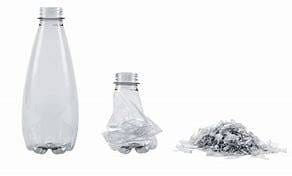Since they are eco-friendly and sustainable, recycled yarns manufactured from rPET bottles have attracted a lot of attention. By respinning discarded plastic into new polyester fibre after it has been melted down, recycled polyester, or rPET, is created. The main application for rPET is in PET or polyethylene terephthalate bottles, which are 100% recyclable. Recycled polyester yarns, especially those manufactured from waste clothing and plastic bottles, offer an affordable alternative. In comparison to the original polyester, these yarns’ manufacture uses fewer resources and produces less CO2. These yarns are viable solutions for recycling polyester both physically and chemically.
Recycled yarns made from rPET bottles are comparable to virgin yarns made from crude oil in terms of their physical characteristics. This yarn can produce clothing that is just as excellent as genuine polyester clothing. According to research, rPET fibres and their mixes can generate yarns with good tensile strength and elongation, which makes them acceptable for use in the textile industry. One of the main obstacles to the expanded growth and supply of rPET, nevertheless, is the lack of an existing source. Despite these difficulties, the surge in recycled yarns made from rPET bottles is a trend that holds promise for eco-friendly textiles and sustainable design.
Recycling In India:
In India, the recycling of plastic bottles into yarn is a quickly expanding industry. The quality of yarn obtained from recycled PET bottles is comparable to that of virgin yarn produced from crude oil, with roughly 80% of PET bottles being recycled. The resulting yarn can be combined with other fibres or used alone to make a variety of fabrics that are just as high-quality as those manufactured from original polyester. Historically, robust, tough, and rough products like jackets, coats, shoes, bags, caps, and accessories were created from recycled fabrics made from PET yarn, but these fabrics were too rough on the skin and might irritate it.
A significant portion of the used PET bottles are converted into staple fibre for non-woven fabrics and fillers after being processed into cleaned flakes. By washing, flaking, and melting the material to be converted into textile-grade fibre or filament, mechanical processes account for the majority of PET that is recycled from PET bottles.
But the lack of an existing, readily accessible supply is one of the main obstacles to greater growth and supply of rPET. Despite this, the sector is flourishing in India, where businesses like Polygenta Technologies Limited, a branch of the US-based Perpetual Global, produce recycled PET yarn of the same calibre as virgin yarn. Additionally, the German business BBE has provided tools and technologies that enable the transformation of PET flakes into a substance like a typical main polymer, enabling the casting of polyester.
A more sustainable option to virgin polyester is provided by the surge in the use of recycled yarns from rPET bottles in India, which also lessens the quantity of plastic trash that ends up in landfills. It will be interesting to see how the sector can further innovate and create new technologies as it expands in order to handle the supply problem and fulfil the demands of the expanding textile industry.
Recycling plastic bottles to make yarn is a practical way to promote sustainability and lessen waste. Recycled PET yarn, also known as rPET yarn, is a viable option for yarn production that uses previously used materials including plastic bottles and waste clothing. This type of recycling is particularly important in India because the nation consumes a lot of plastic and has a waste management issue.
Usage:
A wide range of materials, including robust and long-lasting items like jackets, coats, shoes, purses, caps, and accessories, can be made using recycled PET thread or yarn. It’s crucial to remember that certain materials might be irritating to the skin and can be harsh.
By reusing and recycling PET-based products, the recycled yarns are sent to textile and floor covering producers, which helps to lower carbon footprints. To ascertain which blend ratios and yarn counts are better suited for various products, it is important to note that additional research is required on the use of rPET yarn in India. However, recycling PET bottles into yarn is a potential and green alternative that can support sustainability in India by lowering waste.
Furthermore, one method of utilising the solid household waste that has collected in landfills around the world, including in India, is the treatment of polyethylene terephthalate (PET) bottle wastes. A significant portion of the used PET bottles are converted into staple fibre for nonwoven materials and fillers in the form of washed flakes.

